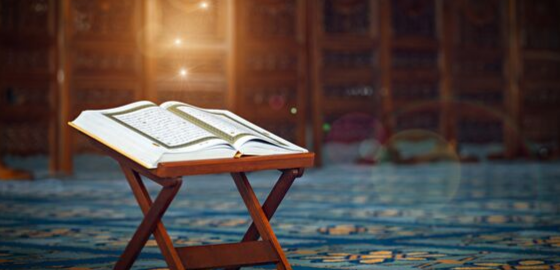Sūrah al-Fajr is a Makkan Sūrah. It contains thirty short and powerful verses, and its theme relates to the rise and fall of nations and their accountability on the Last Day. The primary audience of this Sūrah was the pagan leaders of Makkah. They had grown arrogant in their power and this caused them to reject the message.
The Sūrah begins with a series of oath on various aspects of creation that indicate the passage of time. Allah takes an oath on the dawn, the blessed ten nights (first ten nights of Dhul Hijjah), the concept of odd and even numbers, and the passage of night. All of these concepts relate to time. In this way, the reader is drawn to reflect on the passage of time and the reality of death.
The Fate of Tyrants
The leaders of Makkah were arrogant and did not take the message seriously. So Allah draws their attention to the arrogant leaders before them. In the next few verses, Allah lists various nations that were destroyed due to their arrogance. These include ʿĀd, Thamūd, Iram and the Pharaoh. The stories of ʿĀd, Thamūd and the Pharaoh are repeated throughout the Quran and are well known.
The reference to Iram, however, is a matter of controversy and a lot of differences of opinion. Some commentators say that Iram is simply an adjective describing the buildings of Ad. While others say it refers to another lost city that was also destroyed for its arrogance. Allah knows best. The identity of Iram is not relevant to the message of these verses. The message is clear; nations before you were destroyed because of their arrogance, so do not think that you will get away with it.
The Alternating Tests of Life
The next two verses remind us that life is a series of tests. These tests alternate between good times and bad times. In these verses, Allah refers to both times as tests.
As for man, whenever his Lord tests him, and honors him, and prospers him, he says, “My Lord has honored me.” But whenever He tests him and restricts his livelihood for him, he says, “My Lord has insulted me.”
Sūrah al-Fajr 89:15-16
These two verses show us how most of humanity views good and bad times, and contrasts this with the Islamic view. The majority of people view wealth and success as honor and gifts from God. They see it as validation that what they are doing with their lives must be right. It doesn’t even cross the mind of the average person that wealth and success are tests from God.
But when times are tough, and when people face poverty and hardship. They see it as God being angry with them. They see it as disgrace, humiliation and being abandoned by God. These two reaction reflect a materialistic outlook of life. Relying on worldly success as an indicator of one’s spiritual status is folly.
Rather, Allah draws our attention subtly to the reality. He refers to both wealth and poverty as tests. This is the reality of life. A pious person could be either wealthy or poor, neither affect his piety in any way. A rebellious sinner could also be rich or poor, neither wealth nor poverty reflect his position in the sight of Allah.
Wealth and poverty are not indicators of piety or acceptance. They are simply tests from the tests of life. Allah tests some people with wealth and He will hold them accountable for what they do with that wealth. He tests other people with poverty and will hold them accountable for how they react to that poverty. And He tests some people with both at alternating stages of their lives.
How to pass the test of wealth
The verses that follow teach us how the pagans of Makkah were failing the test of wealth. Passing the test, therefore, lies in doing the opposite of what they did.
Not at all. But you do not honor the orphan. And you do not urge the feeding of the poor. And you devour inheritance with all greed. And you love wealth with immense love.
Sūrah al-Fajr 89:17-20
In these verses, Allah draws our attentions to five ways in which people fail the test of wealth; abandoning orphans, disregarding the poor, stealing inheritance, greed, and loving wealth in an unhealthy manner. The last point is really the core of the matter. An unhealthy obsession with wealth leads to greed, miserliness and oppression in the name of amassing wealth.
Each of these on their own, however, are signs of failing the test of wealth. Allah tests some people with wealth to show how they will use it. Passing the test lies in remain spiritually detached from the wealth (Zuhd), avoiding greed, and being generous to those less fortunate. Failing it lies in the opposite.
The love of wealth is natural, and it cannot be removed completely from the hearts of people. What is condemned is an unnatural love of wealth, an obsession with it. Obsessing over wealth is unhealthy and opens the doors to various evils. This makes the test of wealth more difficult for many people than the test of poverty.
Spiritual Success
If wealth and fame are not signs of success, how then do we define success? The Sūrah ends with a reminder about the Day of Judgment, the day when we will receive the results of the test of life. It is the Day when Allah will hold people to account and people will wish they spent their lives preparing for that day.
The final verses of this Sūrah redefine success for us. Success is not wealth, fame or power. Success lies in purifying our souls, earning the pleasure of Allah and entering Paradise. These closing verses are extremely powerful and touch the soul on a deep level. It is the custom in many parts of this Muslim world to recite these verses when a believer passes away.
These final four verses are a summarized formula for real success; a pure soul, contentment, the pleasure of Allah and entrance into Paradise. What more could any believer ask for? Wealth and poverty are part of the test of life, success lies in having a good ending. The best ending is for your soul to be greeted with these beautiful words;
O Soul that is in a state of inner peace. Return to your Lord, happy and accepted (by Allah). So enter among my worshippers, and enter my Paradise.
Sūrah al-Fajr 89:27-30






